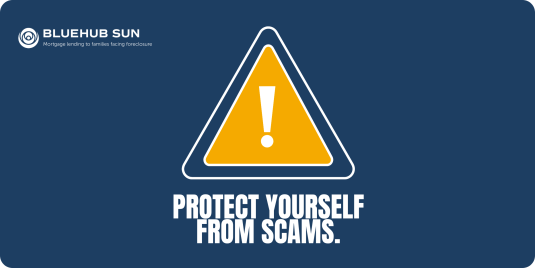Scams are getting much more sophisticated, and homeowners are a growing target. At BlueHub SUN, we believe that staying informed is one of the best ways to stay safe.
We’re sharing this guide to help you recognize common scams reported across the country—especially ones that may affect homeowners. By understanding the warning signs, you can better protect your personal information and finances.
The sections below highlight key scam types, red flags to watch for and what to do if you encounter them. Please note that this is not an exhaustive list and that you should always be on the lookout for potential scams that can come in many different forms.
Toll Payment Scams
Scammers are sending fake texts saying you missed a toll. The text message includes a link that looks real but leads to a fake site that tries to steal your personal or payment information.
These scams are growing. The Federal Communications Commision warns that scammers often pretend to be from toll agencies like E-ZPass or FasTrak. The message may claim your account will be closed or that you owe extra fees if you don’t act fast.
Red flags to watch for:
- The message says to “pay now” or “verify your account.”
- You’re asked to click a link in the message
- The message uses a fake phone number
- You’re told to pay using gift cards, Zelle or wire transfer
- The message doesn’t use your name—just “customer” or “driver”
What to do:
- Don’t click the link
- Don’t reply to the message
- Go to the toll agency’s official website to check your account
- Call their real customer service number
Voice Cloning and Impersonation
Some scammers can now fake voices using AI (artificial intelligence). A call might sound like a family member, a friend, or someone from a trusted company or organization.
They may claim there’s a problem with your account and try to get you to move money or share personal information.
Even if we haven’t seen scammers pretend to be us, it’s important to stay alert—because it can happen. Scammers now only need about 15 seconds of someone’s recorded voice to turn it into a real-sounding fake!
Watch out for red flags like:
- The caller says there’s a problem and urges you to act fast
- You're asked to transfer money to a different account, especially one involving crypto currency
- The person wants your login details or a security code
- The call sounds real but something feels off
- The person insists on communicating via WhatsApp
If something doesn’t feel right:
- Hang up immediately
- Never share codes, passwords, or personal account details
- Contact the company directly using a trusted number
- If you're unsure about a message involving BlueHub SUN, call us at 855-604-HOME or email info@sunhomehelp.org
Investment Scams on Social Media
Scammers may message you about a “get rich quick” investment. They often talk about crypto or stocks. Sometimes they use hacked accounts to look like someone you know.
They may share fake success stories or screenshots to build trust and pressure you to act fast. They may use fake videos of celebrities promoting the “investment.”
Red flags to watch for:
- You’re promised fast or guaranteed returns
- The person pressures you to act quickly
- You’re asked to send money or download an app
What to do:
- Don’t invest through social media messages
- Block and report the account
- Talk to a trusted financial advisor first
Mortgage Scams
Some scammers say they can lower your mortgage payment or stop foreclosure. They may ask for money upfront or tell you to stop paying your lender.
These offers often sound official or urgent, but they’re designed to take your money and put your home at risk.
Red flags to watch for:
- They charge a fee before helping you
- They tell you to stop paying your mortgage
- They say to avoid talking to your lender
What to do:
- Don’t pay anyone before checking if they’re a legitimate lender
- Talk to your lender or BlueHub SUN first
- Find a HUD-approved housing counselor
- Report scams to the Consumer Financial Protection Bureau (CFPB)
Utility Disconnection Scams
Scammers may call or text saying your electricity, gas or water will be shut off unless you pay right away. They often demand payment through prepaid cards, wire transfers, or apps like Venmo or Zelle.
These messages may look or sound real, but real utility companies won’t threaten sudden shutoff or demand payment this way.
Always contact your utility provider directly using the number on your bill if you're unsure.
Red flags to watch for:
- You’re told to pay immediately to avoid shutoff
- They ask for payment through Zelle, gift cards or wire transfer
- You didn’t get a paper bill or notice first
What to do:
- Hang up and call your utility company using a number from your bill
- Don’t pay with unusual methods
- Report the scam to the Federal Trade Commission (FTC).
Tech Support Scams
You might see a popup or get a call saying your computer has a virus. The scammer may ask to control your computer and then charge you to fix it.
They might pretend to be from a well-known company like Microsoft or Apple to gain your trust.
Once they have access, they can steal personal information or install harmful software. Real tech companies won’t call you out of the blue or ask for remote access—if in doubt, hang up or close the popup.
Red flags to watch for:
- A warning appears on your screen out of nowhere
- You’re told to call a number or click a link
- The caller wants to take over your device
What to do:
- Don’t click unknown links or call unknown numbers
- Close the window and restart your computer
- Use a trusted tech support provider
- Report the scam to the Federal Trade Commission (FTC).
How to Protect Yourself
Most scams try to scare you into acting fast. Take a moment. Check the facts. Talk to someone you trust.
Smart steps to stay safe:
- Don’t click on links in messages you didn’t expect
- Don’t share passcodes or account numbers
- Don’t pay using gift cards or money transfer apps
- Don’t rely on caller ID—it can be faked
You can test your scam knowledge by taking the Banks Never Ask That quiz from the American Bankers Association. For more tips, visit the FDIC’s guide to avoiding scams.


